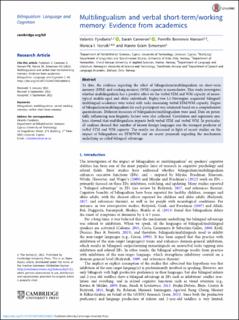Multilingualism and verbal short-term/working memory: Evidence from academics.
Peer reviewed, Journal article
Published version
Permanent lenke
https://hdl.handle.net/11250/3036241Utgivelsesdato
2022Metadata
Vis full innførselSamlinger
Originalversjon
https://doi.org/10.1017/S1366728922000621Sammendrag
To date, the evidence regarding the effect of bilingualism/multilingualism on short-term memory (STM) and working memory (WM) capacity is inconclusive. This study investigates whether multilingualism has a positive effect on the verbal STM and WM capacity of neuro typical middle-aged and older individuals. Eighty-two L1-Norwegian sequential bilingual/ multilingual academics were tested with tasks measuring verbal STM/WM capacity. Degree of bilingualism/multilingualism for each participant was estimated based on a comprehensive questionnaire. Different measures of bilingualism/multilingualism were used. Data on potentially influencing non-linguistic factors were also collected. Correlation and regression analyses showed that multilingualism impacts both verbal STM and verbal WM. All analyses showed that number of known foreign languages was the strongest predictor of verbal STM and WM capacity. The results are discussed considering recent studies on the impact of bilingualism on STM/WM and on recent proposals regarding the mechanism underlying so-called bilingual advantage.

